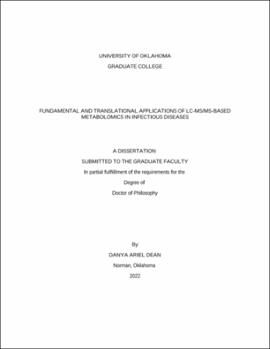| dc.contributor.advisor | McCall, Laura-Isobel | |
| dc.contributor.author | Dean, Danya | |
| dc.date.accessioned | 2022-05-09T19:29:32Z | |
| dc.date.available | 2022-05-09T19:29:32Z | |
| dc.date.issued | 2022-05-13 | |
| dc.identifier.uri | https://hdl.handle.net/11244/335640 | |
| dc.description.abstract | Metabolomics is the study of small molecules (metabolites) <1500 Da. It combines analytical and biochemical techniques to help understand disease pathogenesis. Metabolites also change dynamically in response to disease and hence corresponds closely to host phenotype. They can ultimately present information related to host and disease metabolism. Liquid chromatography tandem mass spectrometry (LCMS/MS) is a technique most used for metabolomics because it is the most sensitive, it has high statistical power, large software availability to analyze data output, and has a high structure annotation confidence. It also can analyze several sample types including tissues, biofluids, and cells. Combining LCMS/MS with a technique called ‘spatial metabolomics or chemical cartography’ can address knowledge gaps in the realm of infectious diseases. Spatial metabolomics/chemical cartography integrates analytical, biochemical, and computational techniques to study metabolites in 3D space. It allows the mapping of metabolites onto 3D organs to determine pathogen and metabolite location, tropism, and distribution. Ultimately, it helps to understand the relationship between local tissue metabolic perturbation and clinical disease symptoms and gives insight to disease pathogenesis. Chagas disease is a neglected tropical disease that is severely understudied and understood, yet affects millions of people worldwide. The influenza virus is one of the most concerning viral based diseases due to its high infection rate. LCMS/MS based spatial metabolomics can be implemented to study these diseases to reveal novel information about how host and disease/disease causing agents interact in the body. In this dissertation, I present fundamental and translational applications of LCMS/MS-based metabolomics in infectious diseases. The data presented here supports the use of spatial metabolomics/chemical cartography in infectious diseases to further understand disease pathogenesis and how infection, whether viral or parasitic, affects host metabolism. | en_US |
| dc.language | en | en_US |
| dc.rights | Attribution-NonCommercial-NoDerivatives 4.0 International | * |
| dc.rights.uri | https://creativecommons.org/licenses/by-nc-nd/4.0/ | * |
| dc.subject | metabolomics | en_US |
| dc.subject | spatial metabolomics | en_US |
| dc.subject | infectious diseases | en_US |
| dc.subject | LCMS | en_US |
| dc.title | Fundamental and Translational Applications of LC-MS/MS Based Metabolomics in Infectious Diseases | en_US |
| dc.contributor.committeeMember | Bourne, Christina | |
| dc.contributor.committeeMember | Rajan, Rakhi | |
| dc.contributor.committeeMember | Lewis, Cecil | |
| dc.date.manuscript | 2022-05 | |
| dc.thesis.degree | Ph.D. | en_US |
| ou.group | Dodge Family College of Arts and Sciences::Department of Chemistry and Biochemistry | en_US |
| shareok.orcid | 0000-0001-6830-4957 | en_US |
| shareok.nativefileaccess | restricted | en_US |

